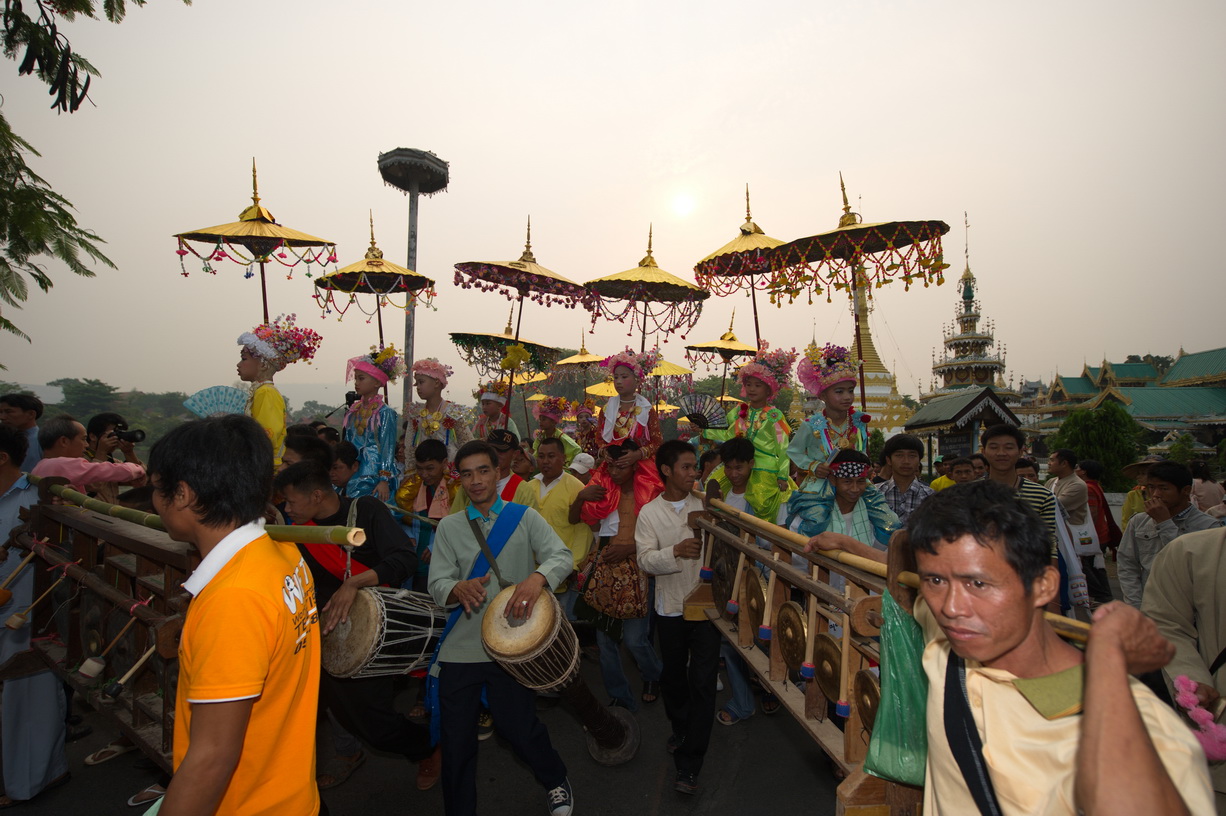Poy Sang Long on:
[Wikipedia]
[Google]
[Amazon]

 Poy sang long ( shn, ပွႆးသၢင်ႇလွင်း) is a
Poy sang long ( shn, ပွႆးသၢင်ႇလွင်း) is a
SEAlang Library Burmese Lexicography
/ref> also means "stage before the final change."
/ref>Moeng, S. T. (1995). ''Shan-English dictionary''. Kensington, Md.: Dunwoody Press. Thus, ''sang long'' (သၢင်ႇလွင်း) refers to a "boy or young man before becoming a novice monk."
"The Poy Sang Long Festival" in ''Chiangrai Magazine''Shan Tradition Rules in a Northern Thai Town
Sai Silp, ''
"Shan - Rites of Passage - Sang Long" in Chiang MaiColorful 2015 Poi Sang Long"Poi Sang Long Festival (Beloved Sons) Mueang Mae Hong Son" ''in Festivals of Thailand''
Ceremonies Buddhist festivals in Myanmar Children's festivals Burmese culture Buddhist festivals in Thailand Rites of passage Buddhism and children {{tradition-stub
 Poy sang long ( shn, ပွႆးသၢင်ႇလွင်း) is a
Poy sang long ( shn, ပွႆးသၢင်ႇလွင်း) is a rite of passage
A rite of passage is a ceremony or ritual of the passage which occurs when an individual leaves one group to enter another. It involves a significant change of status in society. In cultural anthropology the term is the Anglicisation of ''rite ...
ceremony among the Shan people
The Shan people ( shn, တႆး; , my, ရှမ်းလူမျိုး; ), also known as the Tai Long, or Tai Yai are a Tai ethnic group of Southeast Asia. The Shan are the biggest minority of Burma (Myanmar) and primarily live in th ...
s, in Myanmar
Myanmar, ; UK pronunciations: US pronunciations incl. . Note: Wikipedia's IPA conventions require indicating /r/ even in British English although only some British English speakers pronounce r at the end of syllables. As John Wells explai ...
and in neighbouring northern Thailand
Thailand ( ), historically known as Siam () and officially the Kingdom of Thailand, is a country in Southeast Asia, located at the centre of the Indochinese Peninsula, spanning , with a population of almost 70 million. The country is b ...
, undergone by boys at some point between seven and fourteen years of age. It consists of taking novice monastic vows and participating in monastery life for a period of time that can vary from a week to many months or more. Usually, a large group of boys are ordained as sāmaṇera (novitiate monk) at the same time.
Etymology
TheTai Yai
The Shan people ( shn, တႆး; , my, ရှမ်းလူမျိုး; ), also known as the Tai Long, or Tai Yai are a Tai ethnic group of Southeast Asia. The Shan are the biggest minority of Burma (Myanmar) and primarily live in th ...
name ''poy sang long'' is decomposed as follows:
* ''poy'' (ပွႆး) meaning 'event', borrowed from Burmese ''pwe'';
*''sang'' (သၢင်ႇ), thought to come from either ''khun sang'' ('brahman
In Hinduism, ''Brahman'' ( sa, ब्रह्मन्) connotes the highest universal principle, the ultimate reality in the universe.P. T. Raju (2006), ''Idealistic Thought of India'', Routledge, , page 426 and Conclusion chapter part X ...
') or ''sang'' ('novice monk');
*''long'' (လွင်း), from ''along'' meaning Bodhisattva
In Buddhism, a bodhisattva ( ; sa, 𑀩𑁄𑀥𑀺𑀲𑀢𑁆𑀢𑁆𑀯 (Brahmī), translit=bodhisattva, label=Sanskrit) or bodhisatva is a person who is on the path towards bodhi ('awakening') or Buddhahood.
In the Early Buddhist schools ...
or 'king's lineage', borrowed from Burmese ''alaung'' (အလောင်း). ''Long'' (လွင်း), from Burmese ''laung'' (လောင်း),/ref> also means "stage before the final change."
/ref>Moeng, S. T. (1995). ''Shan-English dictionary''. Kensington, Md.: Dunwoody Press. Thus, ''sang long'' (သၢင်ႇလွင်း) refers to a "boy or young man before becoming a novice monk."
Observances
In neighbouring Thailand, where Shan immigrants have brought over the traditions from Myanmar, the ceremony goes on for three days, as the boys (dressed like princes in imitation ofGautama Buddha
Siddhartha Gautama, most commonly referred to as the Buddha, was a wandering ascetic and religious teacher who lived in South Asia during the 6th or 5th century BCE and founded Buddhism.
According to Buddhist tradition, he was born in Lu ...
, who was himself a prince before setting out on the religious path) spend the entire time being carried around on the shoulders of their older male relatives. On the third day, they are ordained, and enter the monastery
A monastery is a building or complex of buildings comprising the domestic quarters and workplaces of monastics, monks or nuns, whether living in communities or alone ( hermits). A monastery generally includes a place reserved for prayer whi ...
for a period of at least one week, and perhaps many years.
See also
* Pabbajjā *Upasampadā
Upasampadā (Pali) literally denotes "approaching or nearing the ascetic tradition." In more common parlance it specifically refers to the rite and ritual of ascetic vetting (ordination) by which a candidate, if deemed acceptable, enters the co ...
*Shinbyu
Shinbyu (; , also spelt shinpyu) is the Burmese term for a novitiation ceremony ( pabbajja) in the tradition of Theravada Buddhism, referring to the celebrations marking the sāmaṇera (novitiate) monastic ordination of a boy under the age of ...
References
External links
"The Poy Sang Long Festival" in ''Chiangrai Magazine''
Sai Silp, ''
The Irrawaddy
''The Irrawaddy'' () is a news website by the Irrawaddy Publishing Group (IPG), founded in 1990 by Burmese exiles living in Thailand. From its inception, ''The Irrawaddy'' has taken an independent stance on Burmese politics. As a publication pr ...
'', April 2007"Shan - Rites of Passage - Sang Long" in Chiang Mai
Ceremonies Buddhist festivals in Myanmar Children's festivals Burmese culture Buddhist festivals in Thailand Rites of passage Buddhism and children {{tradition-stub